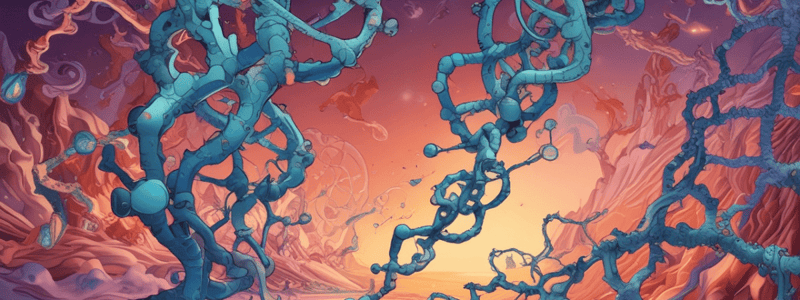Podcast
Questions and Answers
What kind of molecule is a precursor to mRNA in eukaryotes?
What kind of molecule is a precursor to mRNA in eukaryotes?
- tRNA
- pre-mRNA (correct)
- rRNA
- DNA
Which enzyme is responsible for RNA synthesis?
Which enzyme is responsible for RNA synthesis?
- Topoisomerase
- Helicase
- DNA polymerase
- RNA polymerase (correct)
During transcription, what occurs to the introns in pre-mRNA?
During transcription, what occurs to the introns in pre-mRNA?
- They are replicated
- They are translated
- They are removed (correct)
- They are stabilized
What is the role of ribosomes in the process of translation?
What is the role of ribosomes in the process of translation?
Which of the following statements is true about DNA ahead of synthesis in transcription and DNA replication?
Which of the following statements is true about DNA ahead of synthesis in transcription and DNA replication?
Which strand of DNA is the RNA molecule complementary to during RNA synthesis?
Which strand of DNA is the RNA molecule complementary to during RNA synthesis?
What type of bonds are made by polymerases in transcription and DNA replication?
What type of bonds are made by polymerases in transcription and DNA replication?
In which direction does RNA synthesis proceed?
In which direction does RNA synthesis proceed?
Flashcards are hidden until you start studying
Study Notes
The Central Dogma
- Genetic information stored in nucleotide sequences of genes is translated into amino acid sequences of proteins through messenger RNAs (mRNA)
- mRNA codons are translated into amino acid sequences by ribosomes
Transcription and Translation in Eukaryotes
- Primary transcript is pre-mRNA, a precursor to mRNA
- Pre-mRNA is modified at both ends, and introns are removed to produce mRNA
- mRNA is exported to the cytoplasm for translation by ribosomes after processing
RNA Synthesis
- Similar to DNA synthesis, but with ribonucleoside triphosphates as precursors
- Only 1 strand of DNA is used as a template
- RNA chains can be initiated de novo (no primer required)
- RNA molecule is complementary to the DNA template (antisense) strand and identical to the DNA non-template (sense) strand
- RNA synthesis is catalysed by RNA polymerases and proceeds in the 5'→3' direction
Transcription vs. DNA Replication
- RNA does not remain H-bonded to the DNA post-synthesis
- RNA molecules are selective copies of much shorter segments of the DNA
- Both employ polymerases to make phosphodiester linkages
- DNA ahead of synthesis is unwound
- Building blocks are very similar to each other
- RNA polymerase does not need a primer
The "Transcription Bubble"
- Example of transcription bubble: (5') CGCTATAGCGTTT (3') DNA nontemplate (coding) strand, (3') GCGATATCGCAAA (5') DNA template strand, and (5') CGCUAUAGCGUUU (3') RNA transcript
Studying That Suits You
Use AI to generate personalized quizzes and flashcards to suit your learning preferences.




